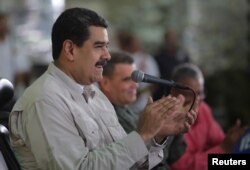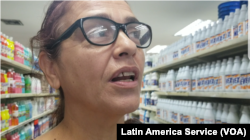The thin, elderly woman paused at a supermarket display of toilet paper to do a quick calculation. A four-roll package cost 115,204 bolivars, almost half of the country's new monthly minimum wage.
"Keep believing in the revolution," she scoffed aloud Wednesday at the store in Naiguatá, a coastal community about an hour's drive northeast of Caracas, the capital.
The woman was talking about the leftist Bolivarian Revolution started by the country's late socialist leader, Hugo Chavez. His successor, President Nicolas Maduro, this week raised the country's minimum wage 40 percent, from 177,608 to 248,510 bolivars. That brings the new basic monthly salary to $74 at the official exchange rate, but just $2.20 on the black market index.
The Maduro administration also added a monthly "food bonus" of about 549,000 bolivars in coupons, raising the minimum monthly food budget to 797,510 bolivars — roughly worth $7.
At the Supermercado Rio Mar here, that would buy little more than five cans of tuna (each containing 4¾ ounces) and 30 eggs.
Maduro, who raised the monthly minimum five times in 2017, says the hikes counter what he contends is a Washington-led "economic war" against socialism, as Reuters reported. On Friday, the U.S. Treasury announced sanctions targeting four more current or former Venezuelan officials for alleged "corruption and repression."
Maduro himself was named last summer to the list of Venezuelans with whom Americans are prohibited from doing business.
But other observers say wage hikes fuel the hyperinflation that has put goods and services beyond the reach of many of Venezuela's 30 million people.
"Whatever the ordinary citizen will buy today, it surely will be much more expensive within a week," said Jose Toro Hardy, an economist affiliated with Concordia, a U.S.-based nonpartisan nonprofit that promotes public-private partnerships. "The processes of hyperinflation always end in political destabilization and rupture of the social fabric."
The International Monetary Fund has predicted Venezuela's inflation rate could top 2,350 percent in 2018.
Poor purchasing power was what shopper Maria Hernandez found at a market on Venezuela's central coast this week.
"I came to look for [laundry] soap and it costs 180,000 bolivars," said Hernandez, a supermarket bakery worker who earns 120,000 bolivars every two weeks. "What do I do? ... Put the clothes in the same soapy water that I've already used?"
Hernandez, who also relies on money sent by her three children living abroad, left the market empty-handed.
"It's like they're playing with us," said Pedro Brito, another Venezuelan shopper who said he'd sold some belongings to buy food. "Neither the salary nor the [food bonus] is close to the price of foods. They are not affordable, neither for the middle class nor for those with fewer resources. It is impossible to shop for a balanced diet."
On the outskirts of an open-air market in Vargas state, an older woman named Carmen told VOA that she would continue to struggle even with the minimum-wage hike. "With the minimum wage, you can buy a kilo of sugar, a kilo of rice and a carton of eggs, but nothing else," she said. "You cannot buy soap or toothpaste."
But a man who overheard Carmen's comments disagreed.
Defending the new basic wage, the unidentified man said, "It's a fair increase. It's not the fault of the government" that food costs are high. "It's the fault of the economic war. The shops are the ones that cheat you."
This story originated in VOA's Spanish service.







![Pedro Brito, a Venezuelan shopper, claimed he'd sold some belongings to buy food. "Neither the salary nor the [food bonus] is close to the price of foods," he said. "They are not affordable."](https://gdb.voanews.com/1C2A77AA-9AAD-4813-B527-5215BD47A640_w250_r0_s.png)